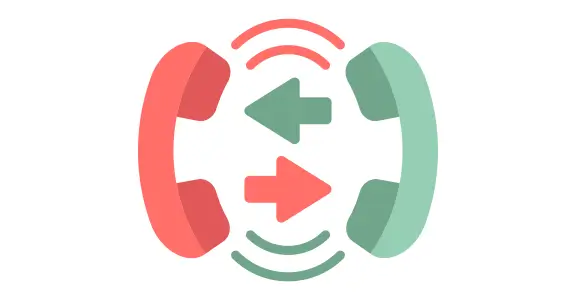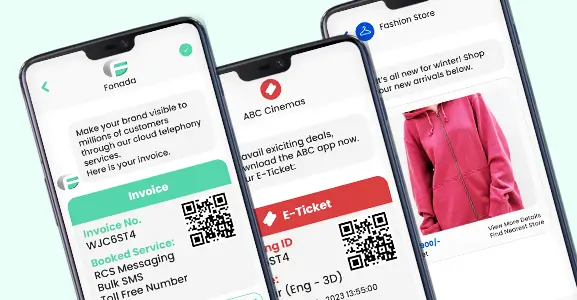Organizations need to deal with higher call volume; that’s why they set up their dedicated call centers or take help from business call centers to handle customer queries efficiently. These business call centers are designed to handle multiple calls simultaneously and are enriched with advanced features such as IVR, analytics, tracking, etc. With these features, call centers help businesses manage the call flow efficiently and enable them to fulfill complex needs of customer communication.
Call forwarding & call transfer are some of the most valuable features that business call centers offer to organizations. You might get confused while differentiating between these two call functions, as this may sound the same. But both the calling functions are entirely different from each other, designed to solve different problems.
In this article, we will discuss call forwarding and call transfer and how these two are different from each other.
So let’s get started…
What Is Call Forwarding?
Call forwarding is an advanced phone management feature meant to forward or redirect calls to an alternative number. For instance, by using the call forwarding feature, you can redirect incoming calls to another available phone number.
This management feature is widely used in offices such that if an employee is not available to receive the call will be automatically redirected to a colleague’s office phone number. This ensures that every caller gets an instant response to their queries and improves productivity.
Today’s advanced phone system enables users to set various rules for Call forwarding. For instance, if you don’t want to answer the call or have blocked someone in that scenario, you can add a number for call forwarding and avoid picking up calls.
Businesses are using the call forwarding feature to streamline their communication with customers. Usually, customer care lines are pretty occupied, and the caller needs to be on hold for a moment. With the call forwarding feature, companies connect their customer with an agent and improve the call pickup rates.
How Businesses Are Using Call Forwarding Features To Deliver A Better Customer Experience
Both businesses and consumers widely use call forwarding. A consumer may use this feature to avoid missing crucial calls.
However, a business utilizes the call forwarding feature for multiple reasons that are listed below:
- Usually, businesses provide a single customer care number as their prime mode of contact. They allow users to call the same number for their queries and concerns related to their products and services. Businesses received thousands of calls from customers. All these calls are forwarded to one or more call Centres because it’s not possible to connect with every customer using the same phone line.
- The call forwarding feature ensures that the agent is answering every call
- Businesses use the phone call forwarding feature to avoid missed calls due to low network coverage.
How Do Businesses Answer Every Single Call Without Any Failure?
Despite getting huge volumes still, businesses can connect with every customer because they use the call forwarding feature in multiple ways:
Forwarding Calls To All Agents: Business call centers forward calls to all the agents. Once the available agent picks up the call, other agents stop getting the calling notifications. This improves the efficiency of call pickup rates and enhances productivity.
Forwarding Called To An Available Agent: The call management software checks and determines how many calls are being taken by agents and distributes the call among available agents evenly.
Call Forwarding Based On Location: Businesses usually provide a single customer care number to their customers irrespective of the location of their consumers. However, when customers call the same number, they are routed to the nearest call center. In that way, businesses offer seamless calling connectivity to every customer.
Also Read: What is Phone Number Masking? How it Benefits Organizations?
What Is Call Transfer?
Call transfer is utterly different from call forwarding. It is the process of transferring a call from one agent to another. When a caller calls an agent and initiates his conversation, he wants complete resolution to his queries. But if the agent feels he can’t resolve all the caller’s queries, he can transfer the same call to those agents who can help callers and provide complete resolution to all the caller’s questions. Routing calls based on customers’ queries from one agent to another is called call transferring.
How Do Businesses Utilize The Call Transfer Feature?
Businesses use the call transfer feature to assist their customers in a better way. Suppose you call a company and have some queries about their services and products. After speaking to the agent, if you are not getting the appropriate answer or if the agent feels he is unable to resolve your queries, he can transfer your call to another agent or department. In that way, businesses not only deal with customers’ questions but also strengthen their bond with the customers.
Type Of Call Transfer
There are two types of call transfer that are listed below:
Cold Transfer: When an agent directly transfers a call to another agent without consulting him about the call, this process is called cold transfer of calls. It helps manage high call volume.
Warm Transfer: To resolve a customer’s queries, an agent puts the customer on hold and connects with another agent to brief him about the customer’s requirements. After getting complete information, another agent connects with the same customer and assists him with his queries. This process is called the warm transfer of calls.
In this calling process, customers don’t have to repeatedly repeat themselves because agents already know customers’ requirement inquiries and can handle the call more efficiently.
What Are The Benefits Of Call Forwarding?
Call forwarding is quite beneficial for both businesses and customers. Let’s explore some of its benefits.
Never Miss An Important Call
With the call forwarding feature, you can easily manage your work call and pick up essential calls even in low network coverage. These features not only help us to make a proper balance in our personal and professional lives but also minimize the stress of not being available for work-related vital calls.
Better Customer Service
Offering better customer service has always been a priority for businesses. When a customer connects with a business using their customer care number, he wants a complete resolution to all his queries.
During the conversation, call forwarding impacts overall customer engagement and experience. So when a call is forwarded to an agent, companies need to ensure whether the agent is capable enough to resolve all the queries of customers or not. The forwarded call should answer all the customers’ questions, and call quality must be excellent, as a bad call experience can ruin the customer experience, which may impact the business’s growth.
Ensure That Your Company Looks Professional
With the call forwarding feature, companies can answer customers’ queries even during odd hours. With this feature, you can add a series of alternative numbers that ensures every inbound call gets an appropriate response from agents. In that way, you can boost the professional image of your business and maintain your availability for your customers 24*7.
Save Money With Call Forwarding
Call forwarding features enable companies to save a lot of money. With this feature, businesses can eliminate the need for expensive hardware installation, and it helps them to minimize the ongoing cost of renting several phone lines.
Conclusion
However, call forwarding and call transfer sound similar but have entirely different working functionalities and are designed to serve some specific purpose. Both the call management features are being utilized by businesses at a broader scale and help them to deal with higher call volume.
If you found this blog helpful then we recommend you to go through our latest blog on What is IVR & How It Is Beneficial for Businesses? This blog will help to know cloud telephony service and how it benefits organizations.
FAQs
Call forwarding is the process of redirecting or forwarding incoming calls to an alternate number. It is the most commonly used call management feature that helps customers and businesses in multiple ways.
Call management is the process of routing inbound calls to call Centre agents. Call management features are not stick to one particular type of function only. They vary from system to system based on the organization’s needs and requirements

Dec 11, 2024
Top Contact Center Optimization Tools For 2024
“A thriving business knows how to fetch maximum output from limited resources by optimizing ca... Read More
Nov 13, 2024
What Is Brand Communication? CPaaS Role Explained
Did you ever wonder why some advertisements grab your attention instantly, while others do not? The... Read More
Nov 01, 2024
What Is Automated Messaging And How Does It Work?
Automated messaging or text automation empowers businesses and marketing professionals to connect wi... Read MoreLatest Updates
From Fonada
Industry Insights, Trends, Innovations, Updates, and Case Studies from Industry Experts
View
Customer
Reviews
Discover why our customers love us - read their authentic and heartfelt reviews!
View
Case
Studies
Explore real-life scenarios, offering analysis, and solutions to practical challenges
View
Convert Leads Into Sales With Fonada
Trusted CPaaS Solution Provider








